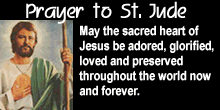


 Did Jesus really rise from the dead -or was it just a lovely story devised by his disciples to keep his teachings alive?
Did Jesus really rise from the dead -or was it just a lovely story devised by his disciples to keep his teachings alive?
St. Paul wrote to the Corinthians: “If Christ has not been raised, your faith is vain” (1 Corinthians 15:17). If it happened, the resurrection of Jesus Christ is the most astounding event in human history. If it did not, then our religion is no more than singing songs, wishful thinking, and being nice people.
What are the facts?
It is easy to be emotional about Easter and focus on the beauty of spring and the hope of eternal life, but these are no more than lovely sentiments if Jesus didn’t really rise from the dead. For our belief to be solid, we need to do some simple and logical detective work. We need to gather the facts and think through the possibilities.
To gather the facts, we turn to the Gospel accounts of what happened. We don’t have space in this article to argue for the reliability of the Gospels. Others have done so, and if you want to back up the truthfulness of the Gospels, I encourage you to do some further research, such as reading Brant Pitre’s book The Case for Jesus: The Biblical and Historical Evidence for Christ (Image, 2016). We will take the Gospel accounts as reliable reports of what took place in that garden outside Jerusalem on a spring morning 2,000 years ago.
Put very simply, the followers of Jesus of Nazareth claimed that he had died and been buried, but that he came back from the dead. He was not a ghost or an apparition. They claimed that he rose from the dead physically and that he did not die again.
The facts and the theories
This event is not only the most stupendous in human history, it is also one of the most hotly debated. There are five possible explanations for the Resurrection:
• The Christian faith, which affirms that Jesus rose from the dead, is true.
• Jesus died, but the apostles were deceived in some way about his resurrection. Maybe they hallucinated?
• The story is a myth - a meaningful tale the apostles devised to explain that Jesus’ life still carried on in their lives and teaching even though he was dead.
• The apostles conspired together to either steal his body or to make up the tale for some reason.
• Jesus didn’t really die on the cross. Maybe he just fell into a coma or fainted.
If the second, third, fourth, and fifth theories are wrong, then the only answer left is that Jesus really did rise from the dead.
Did Jesus really die?
For the fifth theory to be true, we have to believe that Jesus somehow survived his crucifixion. This is difficult to believe because the Roman executioners were expert killers. Furthermore, the execution was public, and the Jewish authorities were there to witness his death and make sure he was really dead.
The soldiers didn’t break Jesus’ legs. This was a tactic they used to hasten the condemned person’s death. That they did not break his legs indicates that they knew he was already dead. They also put a spear in his side to make sure he was dead. The fact that blood and water spurted out is a medical sign of death (see John 19:31–37).
What is most incredible about this theory is that we must believe that Jesus was scourged badly, nailed to a cross, and stabbed with a spear. He was then wrapped up like a mummy and placed in a tomb. Then we are supposed to believe that he somehow unwrapped himself, pushed back a 3-ton stone, and stepped out into a cold spring morning?
Furthermore, we have to believe that when Mary Magdalene and his disciples met this half-dead man staggering around the garden naked, they thought he had risen from the dead. I think they were more likely to have said, “Poor Jesus! He survived! Let’s call for a doctor!”
An imagined story
This is the idea that the disciples fabricated the Resurrection for some reason. But why would they do that? Why would they lie - and not only lie but stick to their story even in the face of torture and death?
The disciples were cowards. Except for John, they all ran away when Jesus was captured. They were hiding out for fear of the authorities when Jesus appeared. They do not strike us as the sort of men who would make up a story for their own gain.
These were simple men - not cunning and deceitful. They had no reason to concoct such a story. What did they have to gain? Nothing. But they had everything to lose. They went on to spend their lives spreading the Gospel, living in poverty, and finally dying as martyrs. They did all this for fiction?
If the disciples were lying, there were plenty of witnesses in Jerusalem who could have proved them wrong. The Jews would have produced evidence against them, or others would have told them they were simply mistaken.
What about a hallucination?
Perhaps the disciples had some sort of vision or hallucination that Jesus had risen from the dead. In other words, he was an apparition or a ghost. The problem with this is that hallucinations are usually private experiences. The same apparition or hallucination might even happen to a few people, but not hundreds as St. Paul reports (see 1 Corinthians 15:6).
Hallucinations don’t last for 40 days. Ghosts don’t eat food. You can’t touch an apparition. Furthermore, the hallucination theory doesn’t account for the other facts. It might explain the so-called visions, but not the empty tomb, the burial cloths, the absence of the corpse, and the stone being rolled away.
To believe the hallucination theory, we have to believe that hundreds of ordinary, commonsense, down-to-earth people all experienced the same hallucination so vividly that they believed the apparition ate, spoke to them, touched them, and invited them to touch him.
Was it a myth?
Maybe this was a story that was devised by Christians long after Jesus’ death to teach the truth that his beautiful stories and actions continued to be alive in the world through his Church even though he was dead.
The problem with this theory is that the story was written down a short time after the events. The Gospels were written within 30 years of the events, and they were based on oral accounts that were in circulation before that. There wasn’t time for a myth to develop.
In addition, the Gospel accounts do not read like a magical myth. They read like eyewitness accounts by real people with real names and histories who experienced something astounding and life-changing. Literary experts such as C.S. Lewis point out that the stories do not operate like myth — with symbols and magical beings. They operate like a historical account.
The Gospels are a collection of stories and sayings that really happened. Virtually every story occurs in a real place, in a real time, with real historical figures. There are concrete details with names, nicknames, and personal observations. The Resurrection account is no different. We would have to believe that in the midst of all the other historical tales, the apostles or later Christians suddenly inserted a mythic tale.
The other four theories - Jesus didn’t really die, the disciples were deceived, they made up the story, or later Christians made a myth -fail. There is only one theory left.
That is the truth that Jesus of Nazareth rose from the dead. He appeared to hundreds and left his apostles with the mission to spread the word of God throughout the world (see Matthew 28:19–20). This is the faith of the Church. This is the faith we affirm to a darkened, dying world. It is the message of life, light, and love that changed history, changed the human race, and can change each one of us.
It is the message of life, light, and love that changed history.


I have been thinking a great deal about my experience at Reconciliation this past Saturday. I felt an intense and unexplainable urge to go and confess my sins when I woke up that morning. I try to go every six weeks or so, but this was no routine visit to the priest for me. I needed to unburden myself of the numerous venial sins I had committed since I last participated in this Sacrament.
Purest Gold: God's Refining Fire in our Lives »
After salvation, many young Christians wonder if there's anything more to their newfound faith than just the security blanket of "being a Christian." Time and time again, God shows himself as a "refiner," and our lives are as gold. God started leading me in this study to understand what He was doing in my life, as well as in the lives of others.
Picking up my pen to write this column, I couldn’t imagine how time flies. Since the last publication of this column I have gone through a lot, especially the loss of my dear mother to whom I dedicate this article. Not only her, but seems I lost a whole generation of my close family.
How to Achieve Business Excellence »
“Do you see a man who excels in his work? He will stand before Kings; He will not stand before unknown men.” Proverbs 22:29
Spiritual Development for our Youth »
Most of us youth in today's fast moving world are easily thrown off by difficulties and worries.
The theme of conversion is a thread that runs all through Lent, but conversion takes on different aspects throughout the phases of Lent. The first two and a half weeks focused on the interior turning of hearts; the liturgy urges the faithful to reflect and examine consciences thoroughly.
Saint Josephine Bakhita »
Feast Day: February 8
Patron Saint Of: Sudan
Saint Josephine Margaret Bakhita was born around 1869 in the village of Olgossa in the Darfur region of Sudan. She was a member of the Daju people and her uncle was a tribal chief. Due to her family lineage, she grew up happy and relatively prosperous, saying that as a child, she did not know suffering.
Catholics Must Fast More Intensely This Lent»
The Norbertine Canons of St. Michael's Abbey have created this digital Lenten retreat so that you can journey through this holy season alongside them. If you want to have one of your best Lenten seasons yet, join us in our Lenten Program "The Great Fast" - https://theabbotscircle.com/the-great-fast-join
When Your Faith Is Put to the Test - Bishop Barron's Sunday Sermon»
Friends, we come now to the Second Sunday of Lent, and we’re on both dangerous and very holy ground with the first reading from the twenty-second chapter of Genesis. The ancient Israelites referred to it as the “Akedah,” which means the “binding”: Abraham binds and is ready to sacrifice Isaac at God’s command.

Copyright © 2002-2024 THE BEACON INTERNATIONAL CATHOLIC MAGAZINE. All rights reserved.
another mc.rufus interactive web design